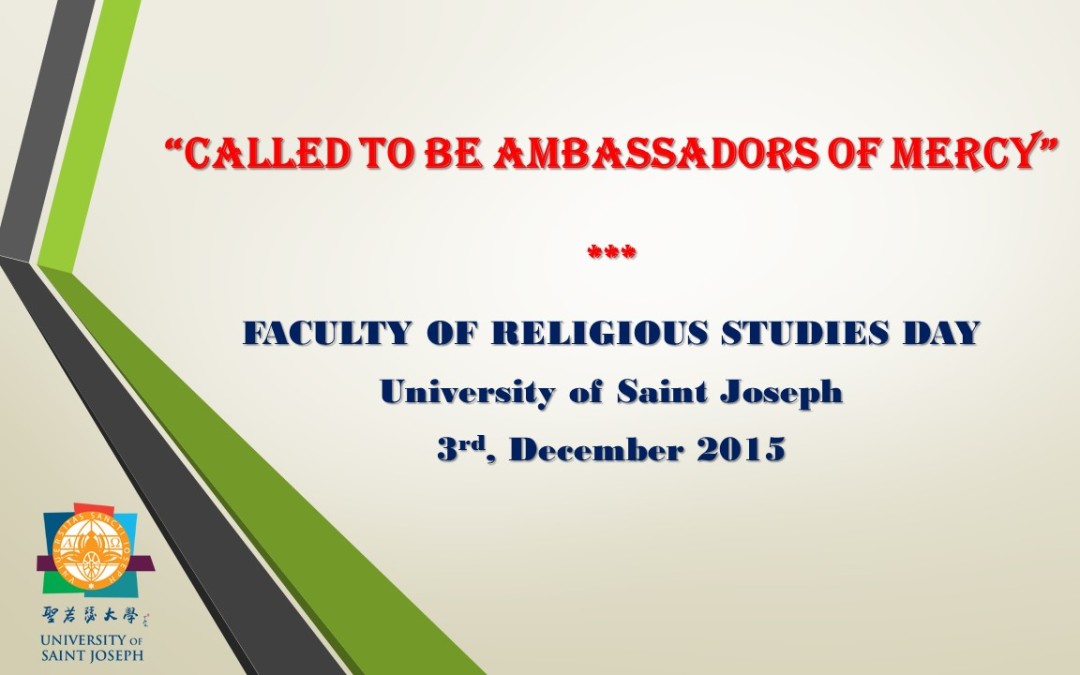
Faculty Day of Religious Studies – University of St. Joseph, Macau
On the 3rd of December 2015, the Feast day of St. Francis Xavier, the University of St. Joseph, Macau, Faculty of Religious studies (FRS), celebrated its faculty day. The act was opened with the Eucharistic celebration, presided by Fr. Franz Gassner, SVD, and took place at St. Joseph’s Seminary Chapel at 9:30am. Some guests, professors and students from the Faculty of Religious Studies attended the Mass.
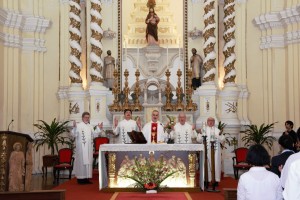 Â Â
  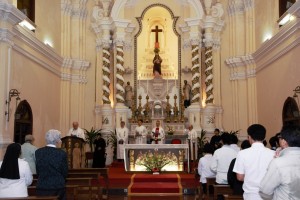
A talk followed at 11:00am, given by a Sister, RC, under the title “Called to be Ambassadors of Mercyâ€. There was an entertaining and formative dialogue between her and the audience after the talk, and then all participants had lunch together, prepared by the students. Afterwards we all spent some time in an animated recreation.
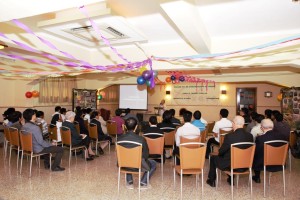
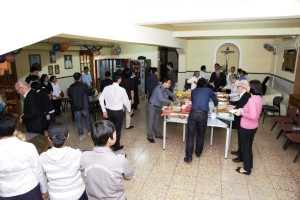
After lunch and recreation there was a second part of the program, activities and performances, at 1:30pm. Students from different academic years took part joyfully by singing and dancing.
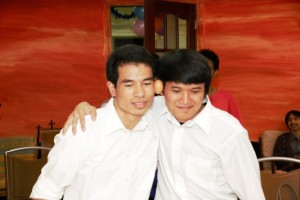 Â Â Â
   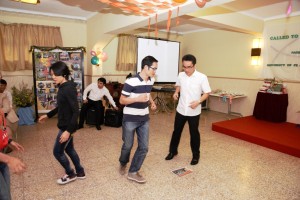  Â
  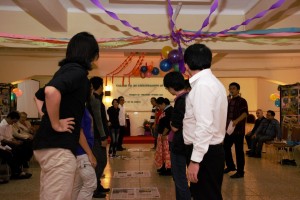 Â
 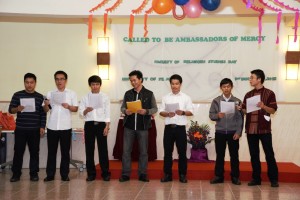
Some games were also played during the activity, and awards were given to those who had performed well and won the first prize in games. The students also distributed souvenirs to the guests and professors in recognition for their presence and support. The joyous celebration was closed at 03:00 pm.
Bro. Stephen Saw Lej, O.P.

MEDITATION ON ADVENT: THE LORD IS COMING!
Advent and Lent are the most important seasons of the liturgical year: both prepare us for the greatest feasts of Christianity. While Lent is the time of penance and prepares Christians for Easter, Advent is the time of hope and prepares the believers in Jesus for his different comings to us.
Advent means “coming,†“arriving.†Who is coming? Jesus! Christian faith speaks of three kinds of Jesus’ coming to us: his first coming at Christmas, his intermediate or middle coming through the journey of our earthly life, and his final coming at the end of time. “In his first coming our Lord came in the flesh and in our weakness; in his middle coming he comes in spirit and in power; in the final coming he will be seen in glory and majesty†(St. Bernard).
As the first Sundays of Advent remind us, Jesus will come at the end of time to judge the living and the dead – all of us. When will his final coming will take place? Nobody knows except our Father in heaven (Mt 24:36). Well, there are always some groups of Christians who keep telling us of Jesus’ immediate final coming. Someone asked Jesus: “Will few be saved?†Jesus answer to him and to us: “Keep on striving to enter through the narrow door†(Lk 13:22-24). What really matters for us is that we keep striving and try to be always prepared and ready to receive Jesus in his final coming at the end of time, and also at the end of our personal life here on earth.

There is between the coming of Christ at Christmas and his final coming at the end of the world, what St. Bernard calls “the middle coming,†which is also very important and the most frequent in our temporal life. Benedict XVI says that the middle coming takes place in a great variety of ways: “The Lord comes through his Word; he comes in the sacraments, especially in the most Holy Eucharist; he comes into my life through words or events.†He continues coming to us in a special manner in the poor and afflicted: “I was hungry and you gave me food… I was sick and you visited me†(Mt 25:35-36).
Through the liturgy of the four weeks of Advent, we Christians are reminded in particular of the coming of Christ at the end of time and, especially during the final weeks, of Jesus’ coming at Christmas. Our Lord Jesus Christ came the first time twenty one centuries ago in history, when He was born at Bethlehem, and He will come again this year in the liturgy of Christmas.
How do we prepare properly for the different comings of Christ into our lives? The Church invites us through Advent to acquire and deepen a hopeful attitude, which is really the attitude of life: we are pilgrims on the way to our God’s home. Christian hope is not “a pie in the sky,†but a commitment to change the present – our present. Rooted in the past, looking towards the future, Christian hope concentrates on the present, on the “nowâ€: God, the object of our hope is “the eternal now†(Hebr 3:7-8). The only thing in our hands is not the past or the future but the present. To be truly hopeful a Christian – and other believers – tries earnestly to be faithful to the present moment: “I just keep concentrating on the present moment… An instant is a treasure. Let us see each instant as if there were no other†(St. Therese of the Child Jesus). What does it mean to live the present, this moment as if there were no other? It means to do what we have to do every moment, every “now†with love. We journey to the house of our Father with steps of love.
To be truly hopeful entails to be vigilant, that is, to be watchful: to see with the eyes of faith and love the realities of our life and our society, and try to transform ourselves and communities according to the values of the Gospel, including justice, solidarity and compassion. To be vigilant, to keep awake means to fight evil, sin, which is always a betrayal of God’s love. Sins of selfishness, pride, lust, insensibility to the needs of the poor are not steps forward or God-ward on our journey of life and of Advent, but steps backward. To be vigilant includes to be temperate by not allowing the body, or our passions, to lead us: “The body under the spirit and the spirit under God.†To be hopeful and vigilant, we are asked to be always motivated by love – of God, of neighbors, of the needy neighbors.
To prepare properly for the encounter with the Lord, we have to be prayerful: “To prepare the way means to pray well; it means thinking humbly of oneself†(St. Augustine). To be humbly prayerful means to ask the Lord constantly for his grace and graces for we are weak: “If the Lord does not build the house, in vain do its builders toil†(Ps 127:1); “the Lord is my light and my salvation, whom should I fear?†(Ps 27:1). The Eucharist in particular is our especial nourishment for the pilgrimage.
Advent then is a time to prepare for the middle comings of Jesus, his final coming, and most proximately for Christmas. Indeed, the Lord is near!
May Isaiah, the prophet of Advent, Luke, the evangelist of the New Liturgical Year (2015-2016: C), and Mary, Our Lady of Hope accompany us on the journey of Advent!
Come, Lord Jesus, come!
(Published by O Clarim, Macau November 27, 2015)
FAUSTO GOMEZ, OP
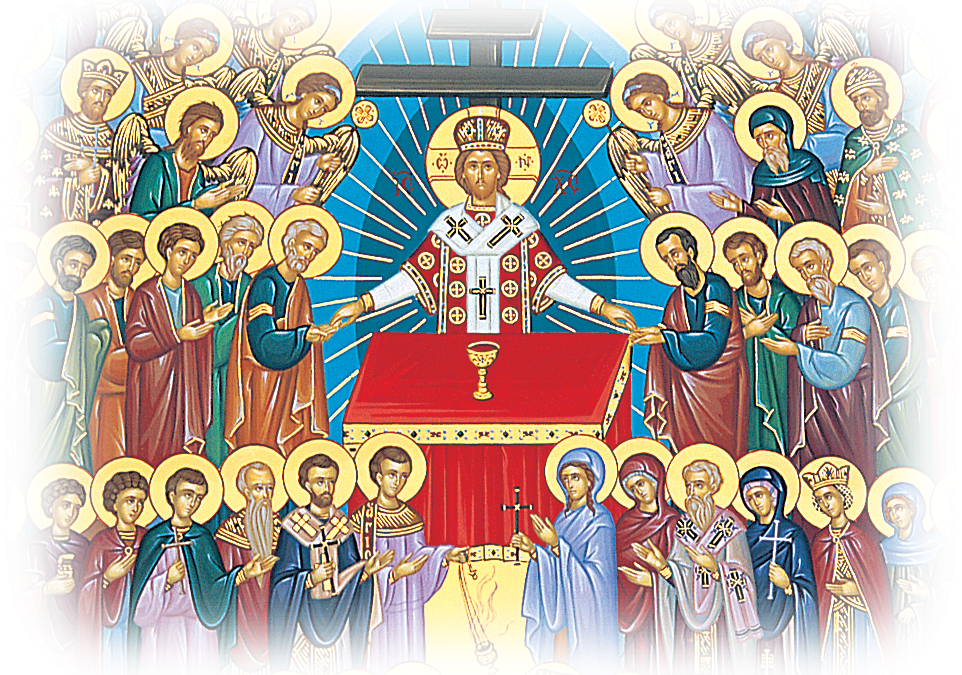
CALLED TO BE SAINTS
On November 1 of every year, Christians celebrate joyfully the Feast of All Saints: the canonized and beatified by our Holy Mother Church and the (not just multitude but) megatude of anonymous saints who lived a holy life, including members of our families, especially our mothers. On the eleventh month of every year, we are reminded of our vocation to holiness.
Vatican II underlines that all Christians are called to holiness, that is, to the fullness of Christian life and to the perfection of charity. (Cf. Vatican II, Lumen Gentium, LG, 40; Catechism of the Catholic Church, CCC, 2013)
Holiness is loving union with God. For us Christians, holiness is loving union with God the Father, through Jesus Christ the Son of God, and in the Holy Spirit, our Advocate and Consoler who is the love of the Father and the Son. Loving union with Christ is called “mystical union, because it participates in the mystery of Christ through the sacraments – ‘the holy mysteries’ – and, in Him, in the mystery of the Most Holy Trinity.†All Christians are called to the mystical union with Christ, although only some receive special graces or extraordinary signs of the mystical life (CCC 2014).
The Holy Spirit, the sanctifier, is the agent of holiness. To Him, holiness is appropriated. (See LG, chapter V). The union with God is union of love with God (vertical dimension). It is also union of love with all neighbors (horizontal dimension).
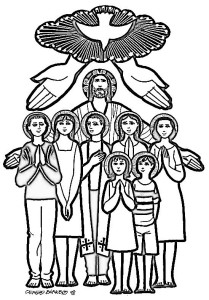
4.2.7
Holiness is a gift of God. As free human beings, we are asked to respond freely to this gift. Our response is our availability: we have to be available like the Virgin Mary and the saints. Our available cooperation means to say yes to God, to his grace that calls us to holiness, to perfection, to happiness; in a word, to do the will of God always. Holiness entails a graceful life, a virtuous life: a life grounded on grace, practiced in virtues, above all the virtue of charity as love of God and neighbor.
The way of holiness passes through the cross. “There is no holiness without renunciation and spiritual battle†(II Tim 4). Spiritual progress implies self-denial and mortification. These lead gradually to live in the peace and joy of the Beatitudes (CCC, 2015). As Christians, we are called to be transfigured on the mountain of our life. This transfiguration, like the Transfiguration of Christ (Mt 17:1-9) gives strength to walk patiently and even joyfully our Way of the Cross.
St. Robert’s father told him: “Son, the only mistake we make in life is not to be a saint.†Indeed, as French convert Leon Bloy says, “There is sadness, only one: the sadness of not being a saint.†Bloy asked himself: “Is it hard to be a saint?†His answer: “No, just one step beyond mediocrity and you are a saint.†Well, perhaps, a few steps!
How to become a saint? By the sacrament of Baptism we become holy in our being as Christians. By our practice of faith we become holy and holier in our life. St. Paul advises us: Live “as is proper for God’s holy people†(Eph 5:3); be clothed with “compassion, kindness, humility, gentleness and patience†(Col 3:12); do the will of God in all things, even – like Jesus – by being “obedient unto death, even to death on the cross†(Phil 2:7-8).
We become saints by being authentic followers of Jesus Christ, the Holy One. Jesus is our way of holiness, and his virtuous life, the path of holiness. The practice of virtues make us holy and happy. Following Jesus, we imitate his prayerful, merciful and selfless life, his boundless love for all, in particular the poor, sick and abandoned. With God’s grace and love, we try to love God and neighbor as Christ loves us (cf. Jn 13:34; LG 42).
Holiness is one: loving union with Christ in the Church, which is holy. However the paths of holiness are many and each one is called to follow the best path for him or her, that is, his or her personal vocation. A single person, a married couple, a religious woman, a priest or a cardinal are all called by the Lord to imitate him essentially in the same way and individually according to the specific path each one is called to follow Jesus. We remember always that all the saints, headed by Mary who is above all saints, point to Jesus. St. Louis-Marie Grignion de Montfort, a great devotee of Our Lady writes: “If you call Mary, the echo is Jesus.â€
Let us be devoted to the Blessed Trinity. Let us be good children of Mary our Mother. Let us venerate the saints of our devotion and imitate their virtues. Let us realize that according to the tradition of the Church guardian angels protect us when facing dangers, and intercede for us before God.
May Jesus, Mary and Joseph, and the saints of our personal devotion accompany us on the journey of life to heaven – to a life in God One and Triune, in Jesus, in the company of Mary and the saints and our family and friends, and the whole company of heaven!
Hard to be a saint? Just a few steps beyond mediocrity. With God’s grace, we try to journey always with steps of love!
(Published by O Clarim, October 23, 2015)
FAUSTO GOMEZ, OP
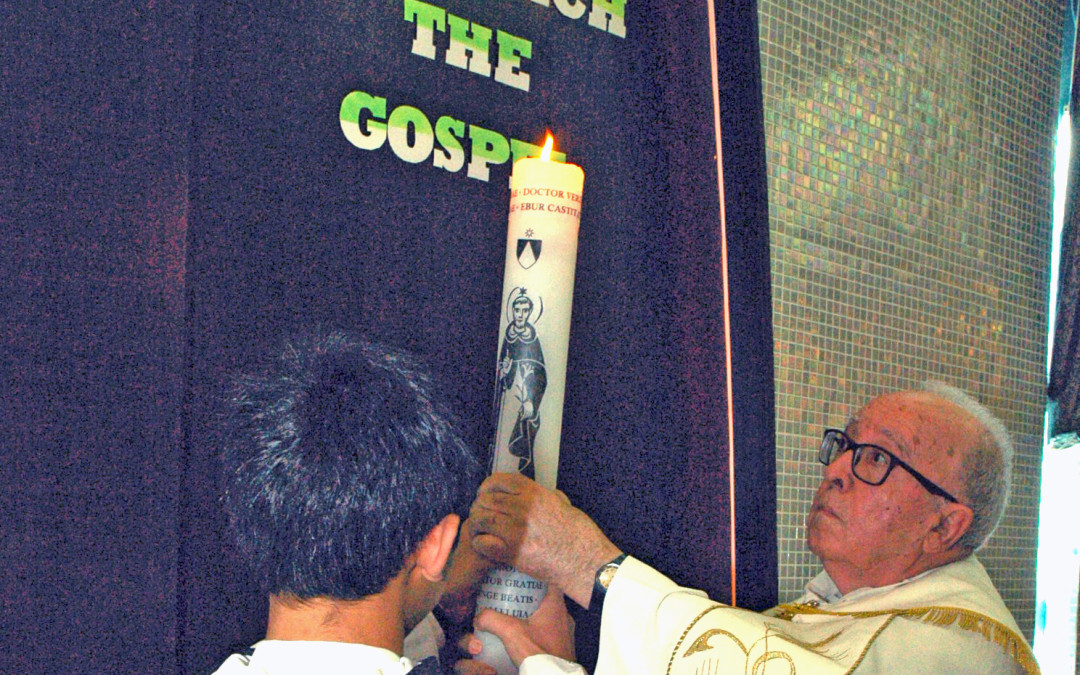
DOMINICANS IN MACAU OPEN JUBILEE 800
The Dominican Family throughout the world opened the Jubilee 800 of their Order, the Order of Preachers (OP), on November 7, 2015, which is the Feast-day of All the Dominican Saints. Dominic’s Family is composed of four branches: nuns, brothers, sisters, and lay and priestly fraternities. All celebrated the Opening Rite of the Jubilee 800 either within the Holy Eucharist or with the Morning or Evening Prayer.
The Dominican Family in Macau opened the Jubilee’s year-long celebration at the Chapel of St. Dominic’s Priory with the Evening Prayer. The Macau Family is composed at present of fifty three brothers and sisters belonging, the brothers to Our Lady of the Rosary Province, and the sisters to the Congregation of Dominican Missionaries of the Rosary. The Dominicans were accompanied by five candidates of a new Dominican branch soon to be formally organized – a Lay Fraternity -, and by some friends of the Dominicans in Macau. With their simple and solemn opening, the Macau Dominicans joined, in prayer and hope, the whole Dominican Family throughout the world.
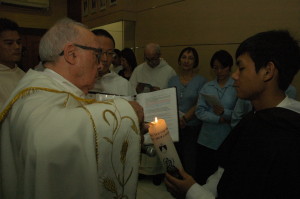
The Opening Rite began with the singing of the first stanza of the song of the Year of Consecrated Life (2015): “Wake up the world – with dawning joy.†It followed with the reading of the Message of the Master of the Order of Preachers, fray Bruno Cadoré. The Message was read by fray Edmond Eh Kim Chew. In his message, fray Bruno greeted joyfully all the members of the Dominican Family from Santa Sabina (Rome) where “Dominic’s preaching was rooted.†“Preaching the Gospel of peace is to preach life given in abundance by the crucified Messiah.â€
Another significant number of the opening of the Jubilee was the Ritual of the Light. The presiding brother, fray Fausto Gomez, offered to God the large Jubilee Candle and asked him to guide us with the light of the Gospel and the fire of Dominic. Then he lighted the Dominican Candle near the door of the chapel and carried it in procession to the left side of the altar while the remaining stanzas of “Wake up the world†were sung by all: “Let us wake up the world with uplifting words of hope.â€
Thereafter, the two Psalms (89 and 98) and the Canticle (Col 1:12-20) of Vespers were recited. The Gospel proclamation (Mt 10:5-16) followed: “And as you go proclaim that the Kingdom of heaven is at hand.†The homilist commented: “This is the chapter from Mathew’s Gospel we apply to our Father and Founder Dominic, who continues sending us today to preach the Gospel everywhere as itinerant preachers. Indeed, as the motto of the Jubilee cries out: “Sent to preach.â€
The presider of the opening ceremonies continued: “Throughout the world, the different branches of the Dominican Family will carry out many and different activities through the Jubilee Year. The external activities are directed to internal renewal. The eight hundred years Jubilee is, above all, “a dynamic process of renewal†– of communal and personal renewal. No real renewal is possible, however, without internal personal renewal and change. Every Dominican, each one of us will change – that is be converted – if he or she really wants: God always helps but He does not force.†He added: “Someone has suggested to all religious that the easiest and most available method for continuing renewal and conversion is active attention to our liturgical calendar: to the daily recitation of the Divine Office, the daily celebration of the Eucharist, the especial celebration of the seasons (particularly Advent and Christmas, Lent and Easter), the commemoration of our saints, and devotion to Mary and to her Rosary. Thus, our daily prayer, personal and communitarian, marks the rhythm of every day and helps each one of us do what we ought to do – our evangelizing mission – in our educational, theological, and pastoral apostolate.â€
After the Homily, the moving ceremony of lighting the little individual candle took place: six members (three postulants of the sisters and three professed brothers) lighted their candles from the Dominican Candle; they in turn lighted the little candle every Dominican was holding. With all the candle-lights burning, the lovely Hymn of the Jubilee was sung by all. It sounded so youthful, joyful and alive! Indeed, the Jubilee is a glorious time to laudare, benedicere et praedicare: “Laudare, we praise our Lord with our saints / Benedicere, we lift our voice in song / Praedicare, we proclaim Your Word to the world.†(By the way, the text inscribed on the Dominican Candle is the text of the treasured O Lumen Ecclesiae, which all Dominicans sing or recite every day after Evening or Night Prayer)
The General Intercessions asking God’s graces were closely linked to Dominican preaching. All responded: “Breathe on us once more with the Spirit of the Risen Christ.†The whole congregation then praised and thanked the good Lord for the countless blessings received from his generosity through eight centuries: “Holy God we praise thy name.†The Jubilee Prayer was sung (in Latin) by the brothers and sisters: “We ask you to pour again into us the Spirit of the Risen Christ that we may faithfully and joyfully proclaim the Gospel of peace.â€
After the Final Blessing, the congregation sung the Marian song Dominicans sing every evening after the O Lumen Ecclesiae: the Salve Regina to Our Lady and Mother Mary, especial protector of the Dominican Order since the time of St. Dominic.
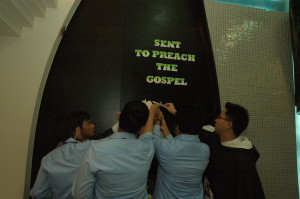
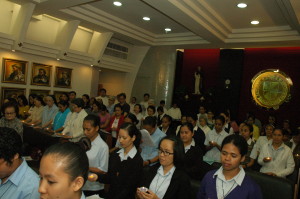
The Jubilee 800 celebration is a fourteen and a half months pilgrimage of renewal. The Macau Dominicans were kindly asked: “Let us put the mobile of our heart on the Jubilee Mode.†With the Opening Rite, the brothers and sisters of the Dominican Family in Macau – like all the Dominicans world-wide – have just taken the first step of the Jubilee journey, a journey that is taking them back to their origins, forward to a hopeful future by their passionate, creative and faithful commitment to preach the Gospel with apostolic zeal in the present. The words of the brother presiding the ritual of opening still echo in the hearts of the Macau Dominicans: “May the Dominican Candle illumine our Jubilee and fire up the hearts of all those who are sent – all of us -, in the words of Pope Honorius III (who confirmed the Order), to proclaim the Word of God, to preach “everywhere the name of our Lord Jesus Christ.â€
With Mary’s motherly protection, and with the sure help of our Father Dominic and the other Dominican saints, the Dominicans continue the journey: the unique Jubilee 800 Journey!
(Fr. Jarvis Sy directed the Opening Rite with the help of the Dominican sisters and brothers. Fr. Jose Luis de Miguel and Sr. Begoña Abad assisted him earlier in planning it according to the directives from the Jubilee 800 Central Committee of the Order. To each and all: God bless, and many thanks)
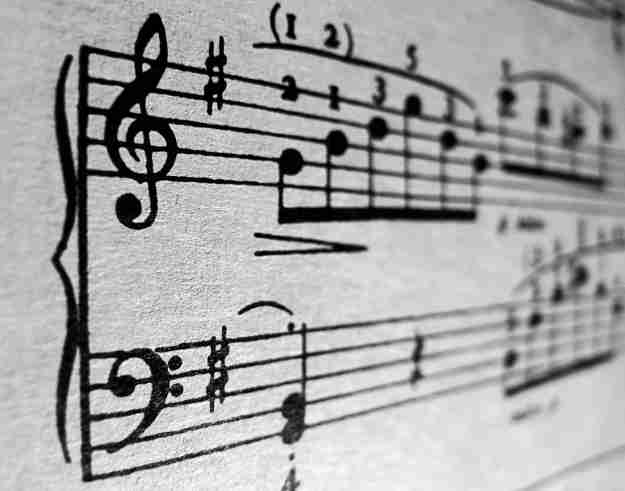
On the occasion of the Eighth Hundredth Jubilee of the Order (1216 2016) some of our gifted brothers in the community had undertaken the delicate venture of putting into music the official prayer of the Jubilee.
Brother Abraham Ning Ki Gei OP had created this beautiful melodic piece so that the jubilee prayer may be part of the communitarian repertoire to honor the Holy Founder. As it was suggested to him, the text was based from the Latin version of the prayer with some editing by the older Fathers. This is to express the universality of the Dominican charism of preaching and the inter-culturality of the Province. Brother Abraham confessed that I tried to be faithful to the meaning and the rhythm of the Latin words making it as an act of love and as a manifestation of gratitude for the vocation to preaching. We are delighted to offer the hymn to you.
The link PDF of the song






 Â Â Â
   










